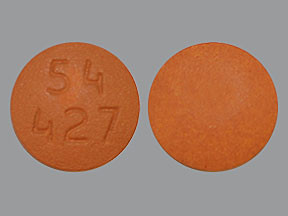DESVENLAFAXINE EXTENDED-RELEASE - ORAL
PHONETIC PRONUNCIATION: (des-VEN-la-FAX-een)
COMMON BRAND NAME(S): Khedezla, Pristiq
GENERIC NAME(S): desvenlafaxine succinate
Uses
USES: Desvenlafaxine is used to treat depression. It may improve your mood, feelings of well-being, and energy level. Desvenlafaxine is known as a serotonin-norepinephrine reuptake inhibitor (SNRI). It works by helping to restore the balance of certain natural substances (serotonin and norepinephrine) in the brain.
How to use DESVENLAFAXINE EXTENDED-RELEASE - ORAL
HOW TO USE: Read the Medication Guide and, if available, the Patient Information Leaflet provided by your pharmacist before you start taking desvenlafaxine and each time you get a refill. If you have any questions, ask your doctor or pharmacist. Take this medication by mouth with or without food as directed by your doctor, usually once daily. The dosage is based on your medical condition and response to treatment. Do not crush, chew, or dissolve this medication in water. Doing so can release all of the drug at once, increasing the risk of side effects. Also, do not split the tablets unless they have a score line and your doctor or pharmacist tells you to do so. Swallow the whole or split tablet without crushing or chewing. To reduce your risk of side effects, your doctor may direct you to start this medication at a low dose and gradually increase your dose. Follow your doctor's instructions carefully. Do not increase your dose or use this drug more often or for longer than prescribed. Your condition will not improve any faster, and your risk of side effects will increase. Use this medication regularly to get the most benefit from it. To help you remember, use it at the same time each day. It is important to continue taking this medication even if you feel well. Do not stop taking this medication without consulting your doctor. Some conditions may become worse when this drug is suddenly stopped. Also, you may experience symptoms such as mood swings, headache, tiredness, sleep changes, and brief feelings similar to electric shock. To prevent these symptoms while you are stopping treatment with this drug, your doctor may reduce your dose gradually. Consult your doctor or pharmacist for more details. Report any new or worsening symptoms right away. If you are switching from another antidepressant to desvenlafaxine, your doctor should slowly reduce the dose of your old antidepressant to prevent withdrawal reactions from the other antidepressant. Ask your doctor or pharmacist for more details. It may take several weeks before you get the full benefit of this medication. Tell your doctor if your condition does not improve or if it worsens.
Side Effects
Precautions
Interactions
Overdose
Images

- color
- peach
- shape
- round
- imprint
- 54 716

- color
- peach
- shape
- round
- imprint
- 54 716

- color
- beige
- shape
- round
- imprint
- 54 427

- color
- pink
- shape
- round
- imprint
- M, DF 50

- color
- pink
- shape
- round
- imprint
- M, DF 50

- color
- dark pink
- shape
- round
- imprint
- M, DF 100

- color
- dark pink
- shape
- round
- imprint
- M, DF 100
Reviews
Faq for DESVENLAFAXINE EXTENDED-RELEASE - ORAL
Desvenlafaxine extended-release is a medication used to treat depression. It belongs to a class of drugs called selective serotonin and norepinephrine reuptake inhibitors (SNRIs) which work by increasing the levels of certain chemicals in the brain to improve mood.
Common side effects of desvenlafaxine extended-release may include nausea, dizziness, headache, dry mouth, constipation, and sweating. It is important to consult your doctor if these side effects persist or worsen.
The onset of action of desvenlafaxine extended-release can vary from person to person. Typically, it may take several weeks before noticing the full benefits. It is important to continue taking the medication as prescribed even if you do not see immediate improvement.
Desvenlafaxine extended-release is only approved for the treatment of major depressive disorder. It should not be used for other conditions unless specifically prescribed by a healthcare professional.
Before starting desvenlafaxine extended-release, inform your doctor about any existing medical conditions, allergies, or medications you are currently taking. It is important to disclose any history of bipolar disorder, liver or kidney problems, or personal or family history of suicide or mood disorders.
It is recommended to consult your doctor before taking desvenlafaxine extended-release during pregnancy or while breastfeeding. The medication may have potential risks to the unborn baby or the nursing infant, and the benefits and risks should be carefully evaluated by a healthcare professional.
Abruptly stopping desvenlafaxine extended-release can lead to withdrawal symptoms such as dizziness, nausea, headache, and irritability. It is important to consult your doctor before discontinuing the medication, as they will provide a proper tapering schedule to minimize withdrawal effects.
Desvenlafaxine extended-release can interact with certain medications including MAO inhibitors, linezolid, and methylene blue, which can lead to a serious condition called serotonin syndrome. It is important to inform your doctor about all the medications you are taking to avoid potential interactions.
If you miss a dose of desvenlafaxine extended-release, take it as soon as you remember. However, if it is close to the time for your next dose, skip the missed dose and continue with your regular dosing schedule. Do not take a double dose to make up for the missed dose.
Warning
WARNING: Antidepressant medications are used to treat a variety of conditions, including depression and other mental/mood disorders. These medications can help prevent suicidal thoughts/attempts and provide other important benefits. However, studies have shown that a small number of people (especially people younger than 25) who take antidepressants for any condition may experience worsening depression, other mental/mood symptoms, or suicidal thoughts/attempts. Therefore, it is very important to talk with the doctor about the risks and benefits of antidepressant medication (especially for people younger than 25), even if treatment is not for a mental/mood condition. Tell the doctor right away if you notice worsening depression/other psychiatric conditions, unusual behavior changes (including possible suicidal thoughts/attempts), or other mental/mood changes (including new/worsening anxiety, panic attacks, trouble sleeping, irritability, hostile/angry feelings, impulsive actions, severe restlessness, very rapid speech). Be especially watchful for these symptoms when a new antidepressant is started or when the dose is changed.
Disclaimer
IMPORTANT: HOW TO USE THIS INFORMATION: This is a summary and does NOT have all possible information about this product. This information does not assure that this product is safe, effective, or appropriate for you. This information is not individual medical advice and does not substitute for the advice of your health care professional. Always ask your health care professional for complete information about this product and your specific health needs.

No Reviews Yet